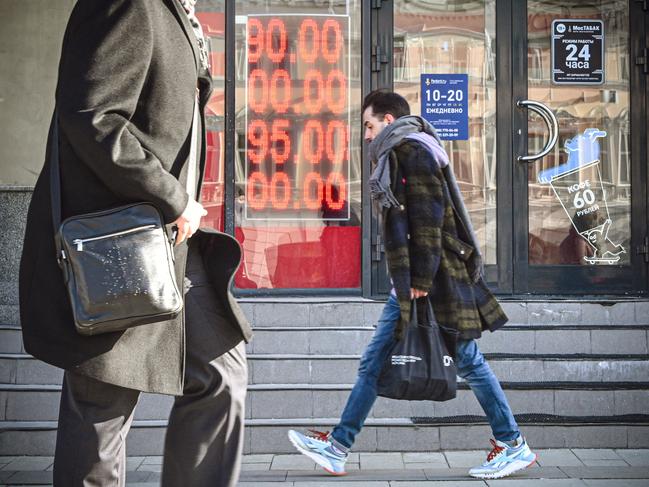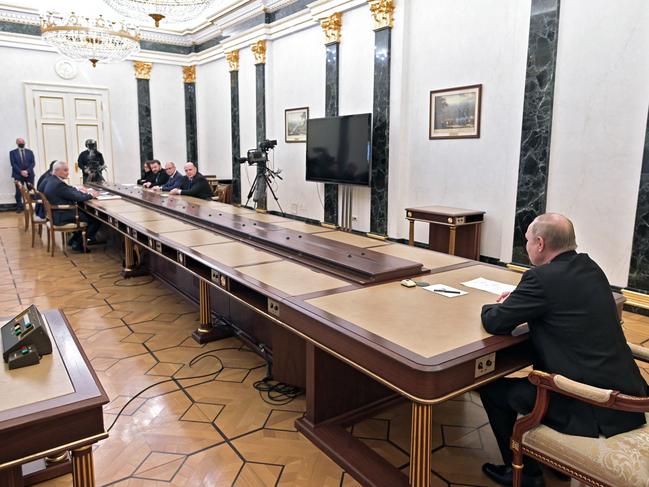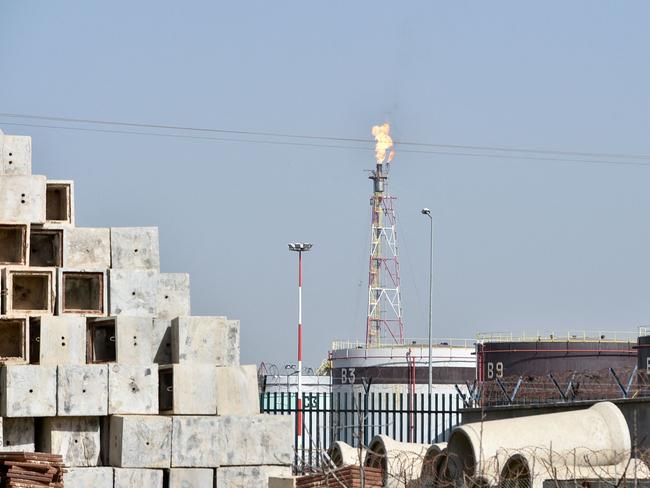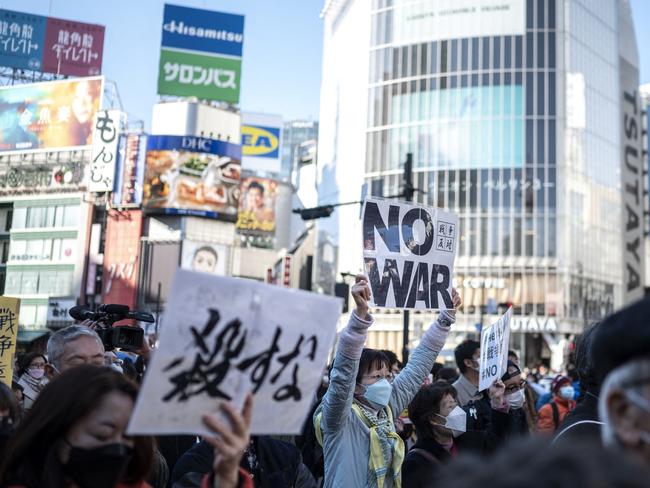Sanctions against Russia escalate with freeze on central bank assets
As punishing sanctions against Russia grow, a defiant Kremlin says Putin will ride out the global retaliation against his invasion of Ukraine.
World
Don't miss out on the headlines from World. Followed categories will be added to My News.
The ruble collapsed against the dollar and the euro on the Moscow Stock Exchange on Monday as the West punished Moscow with harsh new sanctions over the Kremlin’s invasion of Ukraine.
Switzerland has announced it will freeze Russian assets, including those of Russian President Vladimir Putin himself, setting aside its long tradition of political neutrality.
The financial turmoil comes as the US Treasury Department announced a freeze on Russian Central Bank assets, following earlier financial sanctions, including removing some Russian banks from the SWIFT bank messaging system.
Russia’s central bank announced that it would not open share trading at the Moscow stock exchange on Monday “due to the situation that has arisen”. It said that it would make an announcement about trading for the next day by Tuesday morning.

The Kremlin acknowledged the impact on Monday, with spokesman Dmitry Peskov saying that “the Western sanctions are hard, but our country has the necessary potential to compensate the damage.” President Vladimir Putin was set to meet officials including the central bank chief Elvira Nabiullina and the CEO of Russia’s largest lender Sberbank, German Gref, to discuss the economy.
Many Russians queued at ATMs over the weekend, seeking to withdraw ruble savings and exchange them for foreign currency before rates plunged further.
But a defiant Russia said on Monday it would ride out Western sanctions as President Vladimir Putin huddled with officials to discuss the economic turmoil of the five-day-old war.

“The Western sanctions on Russia are hard, but our country has the necessary potential to compensate the damage,” Kremlin spokesman Dmitry Peskov told journalists.
He added that “today Putin will be working on economic questions” and meeting key ministers.
“The economic reality has significantly changed, let’s put it this way,” he said, adding that Russia had taken steps to prepare for it.
“Russia has been systematically preparing for quite a long time for possible sanctions, including the heaviest sanctions that we are now facing,” he said.
Here’s how countries around the world are retaliating against Russia’s invasion of its neighbour Ukraine.
Stream the latest news on the escalating tensions between Russia and Ukraine live & on demand on Flash. 25+ news channels in 1 place. New to Flash? Try 1 month free. Offer ends 31 October, 2022 >

UK
Shares in British energy giant BP slumped Monday, wiping billions of dollars from the company’s value after it said it was exiting Russia over the country’s invasion of neighbour Ukraine.
BP on Sunday said it was pulling its 19.75-percent stake (estimated to be worth $A19.4 billion) in energy group Rosneft, ending more than three decades of investment in Russia.
The British company’s chief executive Bernard Looney also announced his resignation from the Rosneft board.
“Russia’s attack on Ukraine is an act of aggression which is having tragic consequences across the region,” said the company’s chairman Helge Lund.
“BP has operated in Russia for over 30 years, working with brilliant Russian colleagues,” he added. “However, this military action represents a fundamental change.”
Kwasi Kwarteng, Britain’s business minister, welcomed the announcement. “Russia’s unprovoked invasion of Ukraine must be a wake up call for British businesses with commercial interests in Putin’s Russia,” he tweeted.
EUROPE
The EU on Sunday announced new sanctions against Russia over its invasion of Ukraine, closing its airspace to Russian aircraft and banning Russian state media outlets broadcasting in the bloc.
EU chief Ursula von der Leyen, announcing the measures, also said the European Union was taking the unprecedented step of financing arms to Ukraine, and was hitting Russian ally Belarus with sanctions for facilitating the invasion.

The measures come on top of sanctions von der Leyen announced a day earlier that are about to be implemented: cutting some Russian banks out of the SWIFT interbank messaging network, banning all transactions with Russia’s central bank, and added restrictions on Russian oligarchs.
The EU has also sanctioned Russian President Vladimir Putin and his Foreign Minister Sergei Lavrov.
Together, the steps added up to the toughest stance the European Union has taken against a country, reflecting the bloc’s horror and anger at Putin’s assault on Ukraine, launched on Thursday.
“As the war in Ukraine rages on, and Ukrainians fight bravely for their country, the European Union steps up once more its support for Ukraine and the sanctions against the aggressor – Putin’s Russia,” von der Leyen said in a broadcast address.
She said the airspace ban would prohibit flights into or over the EU by “every Russian plane – and that includes the private jets of oligarchs”.
The move against Russian state media targeted its outlets Russia Today – known as RT – and Sputnik, and their subsidiaries. She said they “will no longer be able to spread their lies to justify Putin’s war and to sow division in our Union”.
The EU’s foreign policy chief Josep Borrell, at her side, said the measure involved “banning Russia Today and Sputnik from broadcasting in the European Union”.
Von der Leyen said the sanctions against Belarus were aimed at “the other aggressor in this war”, naming the regime of strongman Alexander Lukashenko.
“We will hit Lukashenko’s regime with a new package of sanctions,” she said. “We will introduce restrictive measures against their most important sectors. This will stop their exports of products from mineral fuels to tobacco, wood and timber, cement, iron and steel.
“We will also extend to Belarus the export restrictions we introduced on dual use goods for Russia.” Belarusians helping Russia’s military operation would also be sanctioned, she said.
Von der Leyen said the decision to provide funding for the purchase and delivery of arms to Ukraine was “a watershed moment for our Union”.

SCANDINAVIA
Swedish truck maker Volvo said on Monday it had halted production at its Russian factory and stopped sales in Russia as a result of sanctions and a deteriorating security situation.
Spokesman Claes Eliasson said Volvo had told suppliers on Friday that it would no longer accept deliveries to the factory in Kaluga, some 150 kilometres southwest of Moscow.
Norway’s state-owned energy giant Equinor on Monday said it would stop its investments in the country and pull out of its joint ventures there.
Equinor had $1.2 billion (A$1.6 billion) in assets at the end of last year in Russia, where it has had a partnership with Rosneft since 2012.
“In the current situation, we regard our position as untenable,” Equinor’s president and chief executive Anders Opedal said in a statement.
Finland, Sweden, Denmark and Iceland Sunday said they would close their airspace to Russian planes, joining other European countries in ramping up sanctions over Moscow invading Ukraine.
Finland, which shares a 1,300-kilometre border with Russia, “is preparing to close its airspace to Russian air traffic,” Transport Minister Timo Harakka wrote in an overnight tweet.
Danish Foreign Minister Jeppe Kofod said on Twitter his country too would “be closing its airspace for Russian aircraft”.
“At today’s meeting of EU ministers of foreign affairs we will push for an EU-wide ban,” Kofod said.
Sweden and Iceland also said they were closing off their skies to Russian planes.
Sweden’s Minister of EU Affairs said a Europe-wide ban would be the most efficient.
“We want it to be done as soon as possible, and the best and fastest way would be that it be done at European level,” he told the TT news agency.
Finland, Sweden and Denmark are EU members, but Iceland is not. Already a number of other EU countries – such as Bulgaria, the Czech Republic, Estonia, Germany and Poland – have closed their airspace to Russian flights, forcing westbound Russian planes to make enormous diversions.
Finland’s flag carrier, Finnair, specialises in flights between Europe and Asia that fly over Russia, but its services are currently limited because of Asian entry restrictions as a result of the coronavirus pandemic.
Finland is also scheduled to approve the dispatch of a consignment of bulletproof vests, helmets and a mobile hospital to Ukraine.
Helsinki has also approved the shipment of around 40 artillery guns to Ukraine.

TURKEY
Turkey on Sunday officially recognised Russia’s attacks on Ukraine as a “state of war” and said it was implementing an international treaty giving Ankara the power to limit warships’ passage through the strategic Dardanelles and Bosphorus straits.
Ankara had called the Russian invasion a “military operation”, but Foreign Minister Mevlut Cavusoglu said: “It’s no longer a military operation but a state of war,” in an interview with CNN Turk television.
“In this case, of course, whichever of them, it can be Russia or Ukraine, we apply the Montreux agreement,” he added.
The 1936 Montreux Convention governs the free movement of commercial ships in peacetime through the Bosphorus and the Dardanelles straits and grants Turkey the right to block warships in wartime if threatened.
Ukraine has officially asked Turkey to close the Dardanelles strait – and thus access to the Black Sea – to Russian ships.
NATO member Turkey, which has strong ties with both Russia and Ukraine, did not immediately respond to this request.
But Cavusoglu said Turkey cannot prevent Russian and Ukrainian ships accessing the Black Sea due to Article 19 of the convention that allows littoral states’ vessels to return to their home base.
He said whether the ship is registered to the home base was clear and warned against any abuse.
“It should not be involved in the war after declaring it will return to the base and passing through the Bosphorus,” the minister said.
Turkey has strong relations with both Russia and Ukraine and has offered to host talks between their leaders.
“We have repeatedly called for a diplomatic solution, but the war is a reality right now,” President Recep Tayyip Erdogan’s top press aide Fahrettin Altun tweeted on Sunday.

ALGERIA
Algeria’s state energy firm is ready to supply Europe with more gas in view of a possible decline due to the Russian invasion of Ukraine, its CEO said Sunday.
Sonatrach CEO Toufik Hakkar said the firm was ready to pump additional gas to the EU from its surplus via the Transmed pipeline linking Algeria to Italy.
Sonatrach is “a reliable gas supplier for the European market and is willing to support its long term partners in the event of difficult situations,” Hakkar was quoted as saying in the daily Liberte.
Hakkar nonetheless said this would be contingent on the availability of a surplus of gas or liquefied natural gas (LNG) once the national demand and “contractual engagements” are met.
He pointed to an “unused capacity” in the Transmed pipeline that could be used to “increase the supplies to the European market”.
The Transmed pipeline, jointly operated with Italy’s ENI, has a capacity of some 32 million cubic metres per year – four times that of the Medgaz pipeline to Spain.
The top executive added that Sonatrach could expand its supplies to countries not currently served by existing pipelines via LNG tankers.
Hakkar said Europe is the “natural market of choice” for Algerian gas, which accounts for about 11 per cent of Europe’s gas imports.
Former Algerian energy minister Abdelmajid Attar meanwhile told AFP that “Algeria exports a maximum of 22 billion cubic metres (of gas) via the Transmed pipeline”, leaving a capacity of 10 billion cubic metres.
He nonetheless noted that Algeria alone will not be able to “compensate for the decline in Russian gas supply”, noting that it can offer a maximum of two or three million additional cubic metres.

JAPAN
Japan will join Western nations in removing selected Russian banks from the SWIFT messaging system, the country’s prime minister said Sunday, piling further pressure on Moscow over its invasion of Ukraine.
“In what was released this morning by the Western nations, steps are taken to isolate Russia from the international financial system and the world economy including exclusion of specific Russian banks from SWIFT,” Prime Minister Fumio Kishida said.
“Western nations have requested Japan participate. Japan will join this initiative,” he added.
SWIFT’s messaging system allows banks to communicate rapidly and securely about transactions, and cutting Russia off would cripple its trade with most of the world.
Embattled Ukrainian President Volodymyr Zelensky on Saturday once again asked the international community to sever Russia from the SWIFT system.
Kishida’s government has already announced a series of joint sanctions against Moscow, targeting financial institutions and semiconductor exports, working with its partners in the Group of Seven.
“In light of this emergency situation, Japan reiterates that we stand in solidarity with the people of Ukraine who are striving to defend their sovereignty, territory, motherland and families,” he said.
He also announced Japan would seek to identify and freeze assets belonging to President Vladimir Putin and other senior Russian officials.
Japan, a key US ally, has complex relations with Russia and did not sign a peace treaty after World War II because of a lingering dispute over four islands claimed by Moscow in the closing days of the conflict.
The islands, off the coast of Japan’s northernmost island of Hokkaido, are known as the southern Kurils in Russia and the Northern Territories in Japan.
Originally published as Sanctions against Russia escalate with freeze on central bank assets


